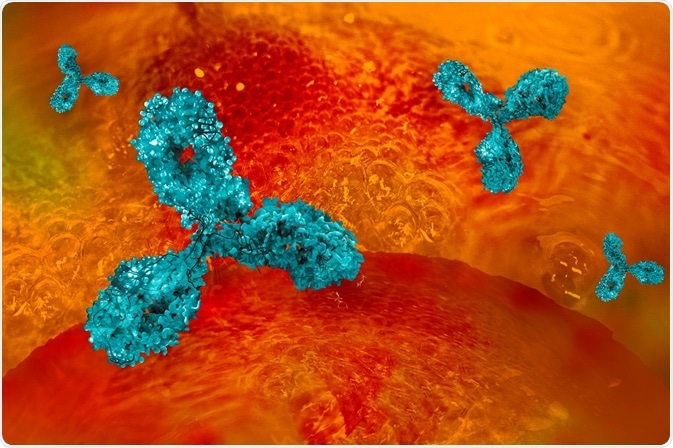Allostery is a regulated biological process by which the effect of binding of macromolecules at one site is transmitted to another site. Allostery improves the affinity of antibodies for the epitopes they bind to.
 Image Credit: Mirror-Images / Shutterstock
Image Credit: Mirror-Images / Shutterstock
Over the years, a number of methods have been developed to study allostery and its application in different scientific fields such as conformational mechanisms, drug discovery, and various diseases.
Monoclonal antibodies are immunoglobulins that are produced from clones of a single parent cell. These immunoglobulins are identical and can be grown indefinitely.
They recognize and bind to specific receptors or locations in the body, which makes them an ideal candidate for the treatment of different types of cancers.
One method employed in oncology is the coupling of a cytotoxic agent that can destroy the cancer cells to an antibody which recognizes tumor-associated antigens. This enables the healthy cells to be left unharmed.
Allosteric interactions in monoclonal antibodies
The central dogma behind the functioning of an antibody is the interaction of its variable (V) region with the antigen, followed by activation of the effector cells by the constant (C) region of the antibody.
However, recent research suggests that conformational and configurational allosteries also exist between the “V” and “C” regions of the antibodies that aid in activation of the effector system.
Although monoclonal antibodies are highly specific with respect to their biological activity, they also exhibit allosteric effects. These allosteric interactions can bring about changes in the conformation of the antigen, thereby affecting its biological activity and interaction with other monoclonal antibodies.
Allosteric interaction is particularly useful in the case of therapeutic biologics. Recent research on immunoglobulin A (IgA) antibodies has demonstrated that the “C” region of the antibody can reduce the systemic side effects caused by IgG isotypes.
Aguilar and his colleagues also showed that allosteric effects in monoclonal antibodies enhance human growth hormone binding on the hormone-binding site.
Apart from the region-specific functions of the Fc effector cells of monoclonal antibodies, studies have shown that Fc can also affect the antigen binding. As a result, it is pertinent to conduct studies that would consider antibodies in its entirety than as fragmented functional regions.
Positive allosteric effects
Several studies have revealed the positive effects of allosteric monoclonal antibodies on various diseases.
For example, in an attempt to develop a novel treatment for patients with type 2 diabetes, Bhaskar and his colleagues used an allosteric, human monoclonal antibody known as XMetA and applied phage display technology to target insulin receptors coupled with insulin.
In this study, XMetA displayed allosteric effects and did not compete with insulin to bind to the insulin receptors. In contrast, it markedly reduced the blood glucose levels during fasting, with patients showing improved HbA1c levels within six weeks.
Negative allosteric effects
The lack of binding of paired monoclonal antibodies is not only due to the overlap of corresponding epitopes, but also due to the monoclonal antibody-induced change in conformation on the antigen molecule. This negative allosteric effect on the conformation also affects the binding of other monoclonal antibodies.
The results of various studies indicate that allosteric monoclonal antibodies show the potential to be used as ultra-long acting therapeutic agents in different fields of medicine such as oncology and diabetology, as well as in various biochemical assays such as ELISA, Western Blot and others testing methods that enable the recognition of a specific epitope.
Further Reading